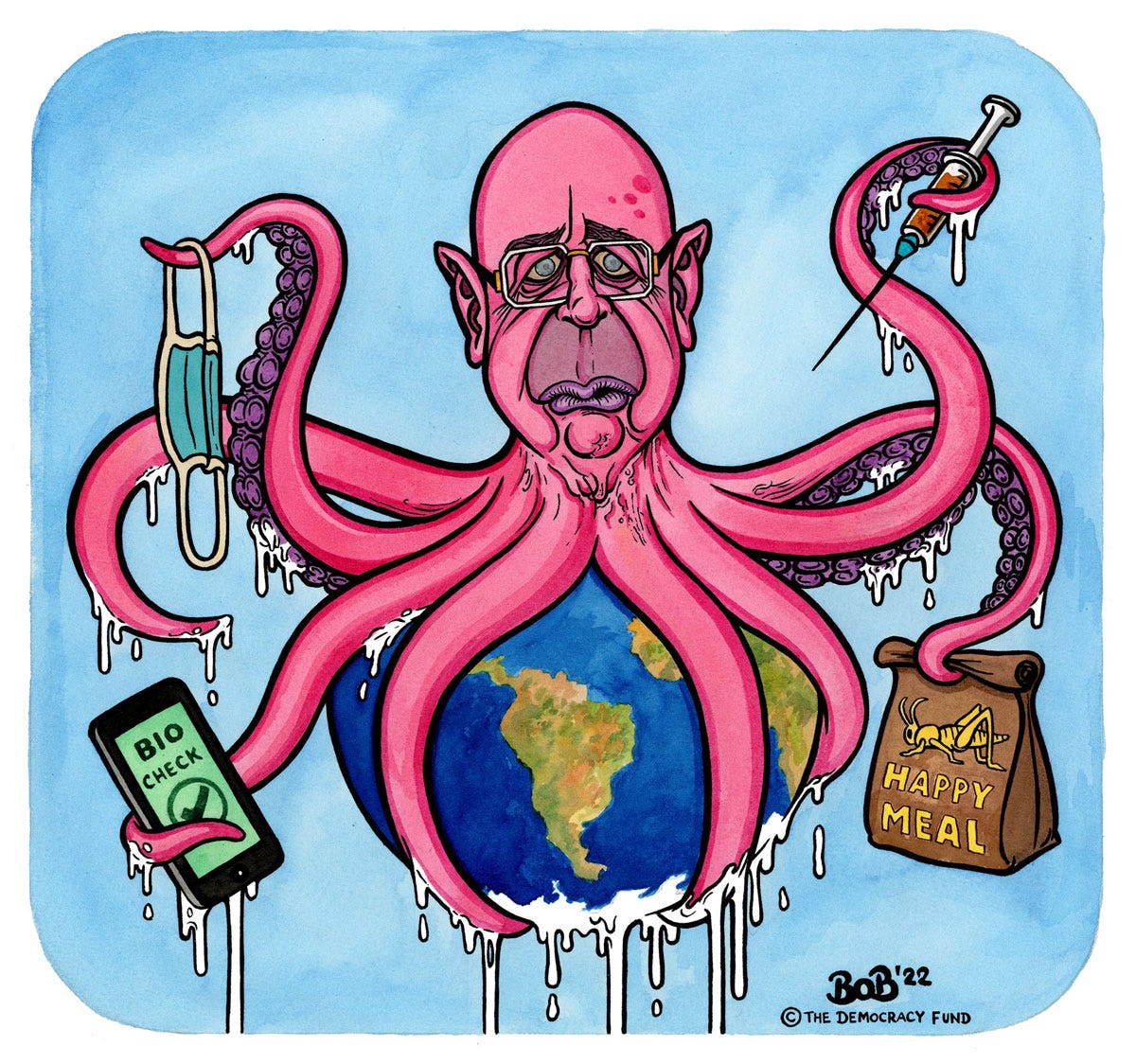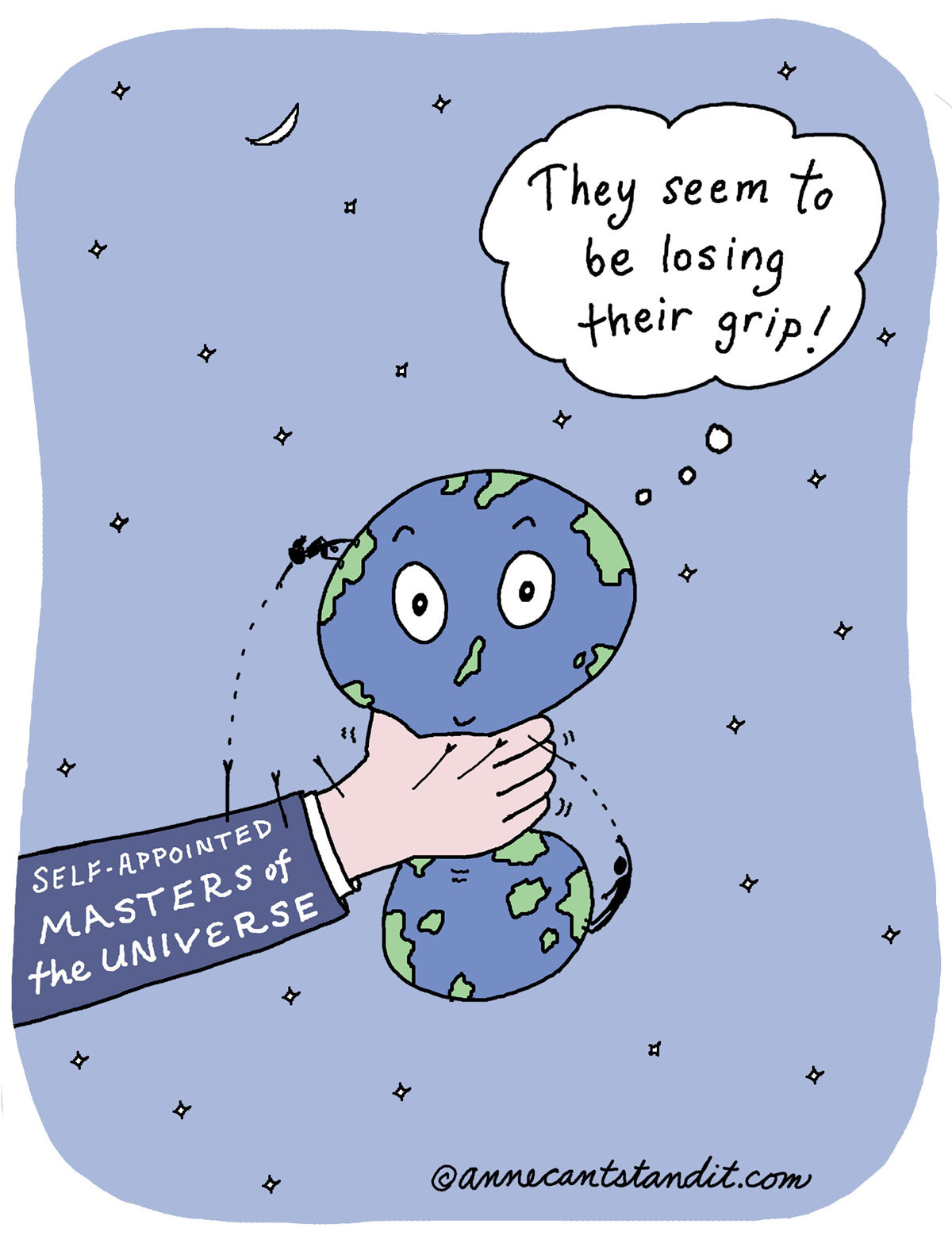Yuval Noah Harari: Not the Man We Think He Is?
by Margaret Anna Alice. Originally published on her Substack.
This is Part 3 of Anatomy of a Philanthropath. Read Part 1: A Mostly Peaceful Depopulation and Part 2: Downloadable Digital Dictatorships to see what you missed.

“Of all tyrannies, a tyranny sincerely exercised for the good of its victims may be the most oppressive. It would be better to live under robber barons than under omnipotent moral busybodies.… To be ‘cured’ against one’s will and cured of states which we may not regard as disease is to be put on a level of those who have not yet reached the age of reason or those who never will; to be classed with infants, imbeciles, and domestic animals.”
—C.S. Lewis, God in the Dock: Essays on Theology & Ethics (Kindle, paperback, audiobook)
Given the zest with which Yuval Noah Harari pontificates about global digital surveillance dictatorships, you may be inclined to think he is advocating these scenarios. When you see the context that has been excised from these clips, however, it becomes clear he is actually warning against such nightmarish outcomes.
As enticing as it is to paint Harari as a diabolical mastermind, it requires a dismissal of the unexpurgated footage in which he reflects on how we can veer off the nearly inevitable path to totalitarian dystopia.1
He frequently suggests, for example, that engineering and computer science programs incorporate an ethics curriculum, and he recommends books such as Weapons of Math Destruction: How Big Data Increases Inequality & Threatens Democracy, The Age of Surveillance Capitalism: The Fight for a Human Future at the New Frontier of Power, and Hannah Arendt’s The Origins of Totalitarianism.
As a sidenote, Harari seems to have taken this passage where Arendt quotes Eric Voegelin’s 1948 Social Research article The Origins of Scientism at face value and set about making it his mission:
“… thus totalitarianism appears to be only the last stage in a process during which ‘science [has become] an idol that will magically cure the evils of existence and transform the nature of man.’”
—The Origins of Totalitarianism (Kindle, paperback, hardcover, audiobook)
During the Athens Democracy Forum Dialogue: The Geopolitics of Technology, Harari proposes that one solution to the prospect of a tyrannical biosecurity state is to surveil governments (@ 24:05):
“[T]urn it around. Survey the governments more. I mean, technology can always go both ways. If they can surveil us, we can surveil them.”
Note that he still supports the idea that the citizenry be surveilled but simply expands that principle to governments and corporations, whereas any rational individual who values freedom, privacy, and protection from tyranny would resolutely reject the proposition that people be biosurveilled—ever. The instant that occurs is the instant humanity becomes enslaved.
In a conversation with Daniel Kahneman moderated by Kara Swisher (@ 1:27:31), Harari says he cautions engineers to:
“Think about the politician you most dislike in your country or in the world, and now think what he or she will do with your invention, and now think again about how to design your invention.”
Toward the end of that discussion, he responded to a question about what the best future looks like in a hundred years with:
“I think that the two key things is that first the power resulting from all these inventions is shared, not equally between everybody but at least not concentrated in the hands of a tiny elite, either a human elite or a nonhuman elite, and secondly … the power to hack human beings is used not to manipulate us, not to control us but to help us understand ourselves better and improve ourselves. You know the old saying, ‘Know thyself.’ Now we have the technology to do it if the technology is used for our benefit and not for the benefit of some big corporation or totalitarian government, then this can be, really, the best society that ever existed.”
I’m not saying Harari is a good guy. I’m saying he thinks he is a good guy. And that makes him even more dangerous, especially when he is influencing2 genuine villains like Doctor Doom-meets-Lex Luthor Klaus Schwab, who takes his admonitions as a how-to book on achieving global technocratic tyranny.
Assuming Harari is speaking in good faith and not disguising viperous ulterior motives, he is frightfully naïve if he believes a biosurveillance security state would never abuse that power and that the surveillers would submit to the same absolute transparency themselves.
The Inner Party is always allowed the privilege of turning off the telescreen:
Harari encourages people to place their faith in institutions and laments the growing distrust of them (gee, I wonder why):
“… we need institutions actually more, but there is this wave of distrust against them. Now, it doesn’t mean we need the old institutions. It doesn’t mean that we have to stick with the old media. Maybe we need new media institutions, which will be more diverse, which will give more people a chance to voice their opinions, but in the end we will need to build these institutions.
“The idea that we can just do without them, that we’ll have just this free market of ideas and anybody can say anything, and we don’t want institutions to kind of stand in the middle, and curate and decide what is reliable and what is not reliable, this doesn’t work, it’s been tried so many times in history.
“You know, if you look at religious history, to take a counter example, so you have in Christianity, again and again these people coming and saying, ‘You know, we don’t want the Catholic Church, this institution, let’s just every person can read the Bible for himself and know the truth,’ what is more simple than that, why do we need an institution, and you have the Reformation, the Protestant Reformation. And within twenty years or fifty years, they realize that when you let every person read the Bible for themselves, you get 100 different interpretations, radically different. So eventually someone comes and says, ‘No, these are the correct interpretations,’ and you get the Lutheran Church. And after 100 years, someone says, ‘Wait, but the whole idea of the Reformation was to get rid of the Church, so we don’t want the Lutheran church. Let every person just read the Bible and understand by themselves.’ And you have chaos. And after 50 years, you have the Baptist Church, and this church, and that. You always go back to institutions. So it’s the same with the kind of information explosion that we have right now.”
With absolutely no sense of irony, Harari in one breath warns against the risk of totalitarianism and in the next suggests that that institutions be the deified curators of truth—in other words, the “high priests in a secular theocracy.”
He says the most important thing for individuals to do to defend democracy is to join an organization, and then he expresses his wish that an engineer develop “an antivirus for the mind”—which anyone familiar with history understands would be wielded to menticide citizens into compliance and remove barriers to belief in the theocratic State’s proclamations.

A victim of mass formation himself, Harari sees organizations such as the WEF and WHO as agents of good rather than potential vehicles for one-world tyranny, arguing that the WHO should be granted more power and funding:
“The skeleton of such a global anti-plague system already exists in the shape of the World Health Organization and several other institutions. But the budgets supporting this system are meagre, and it has almost no political teeth. We need to give this system some political clout and a lot more money, so that it won’t be entirely dependent on the whims of self-serving politicians.
“As noted earlier, I don’t believe that unelected experts should be tasked with making crucial policy decisions. That should remain the preserve of politicians. But some kind of independent global health authority would be the ideal platform for compiling medical data, monitoring potential hazards, raising alarms, and directing research and development.”
Klaus is more than eager to latch his tentacles around the globe in the name of saving it. Indeed, he already has.

He gloats about owning all of the stakeholders necessary to gain world dominion:

Schwab: If I look at our stakeholders, we have business, of course. That’s a very important audience, and we have politics. We have continuous partnerships with many governments around the world. Then, of course, we have NGOs, we have trade unions, we have all those different parts.
Interviewer: Media, of course.
Schwab: Media, of course. And very important, experts and scientists and academia. Because if we are looking at the future, I think we should look at new solutions, and the new solutions will be very much driven by technological developments.
Interviewer: And we even have, you even have religious leaders, right?
Schwab: Religious leaders. We have social entrepreneurs. Very important, social entrepreneurs.
And who can forget his rodomontading about having penetrated most of the major governments—Canada especially?
The WEF Young Global Leaders are like Village of the Damned children planted strategically throughout the world, poised to atomize democracy, freedom, truth, and justice on command:
With his ever-splendacious wit, Neil Oliver summarizes the aim of the billionaires congregating at Davos thus:
“The usual suspects have been in Davos again, at the World Economic Forum overseen by Klaus Schwab—the few hundred of the most unimaginably rich gathered in one place to fantasise together about what the several billions of us ought to be forced to do in order to make those billionaires’ lives better.
“Those poor billionaires—for whom everything on Earth might finally be perfect, if only someone would invent the vacuum cleaner big enough to suck every last one of us peasants, inconsequential specks of dust that we are, into outer space once and for all.”
From philanthropaths Gates to Soros to Schwab and their intellectual enablers Meadows to Kissinger to Harari, all believe they are righteously fulfilling their calling as saviors of the planet, conquering threats such as disease, overpopulation, populism, disinformation, and chaos.
In so doing, they have become monsters themselves:
“Whoever fights monsters should see to it that, in the process, he does not become a monster himself. Gaze long enough into an abyss, and the abyss will gaze right back into you.”
—Friedrich Wilhelm Nietzsche, Beyond Good & Evil (Kindle, paperback, hardcover, audiobook)

Anatomy of a Philanthropath
A philanthropath wants you dead … for the good of humanity.
A philanthropath wants you enslaved … for the good of liberty.
A philanthropath wants you silenced … for the good of free speech.
A philanthropath wants you confined … for the good of your health.
A philanthropath wants to surveil you … for the good of security.
A philanthropath wants you to eat orthopterans … for the good of the planet.
A philanthropath wants you to pay more for less … for the good of the economy.
A philanthropath wants you to own nothing … for the good of the reset.
A philanthropath wants you ill … for the good of their sickcare system.
A philanthropath wants you dependent … for the good of their fiefdom.
A philanthropath wants you addicted … for the good of their supplying.
A philanthropath wants you to sacrifice … for the good of their coffers.
A philanthropath wants to sacrifice you … for the good of their spoils.
A philanthropath wants you asleep … for the good of their programming.
A philanthropath wants you ignorant … for the good of their steering.
A philanthropath wants you anxious … for the good of their molding.
A philanthropath wants you deluded … for the good of their lying.
A philanthropath wants you oblivious … for the good of their narrative.
A philanthropath wants you fearful … for the good of their terror.
A philanthropath wants you hateful … for the good of their politics.
A philanthropath wants you isolated … for the good of their bonding.
A philanthropath wants you envious … for the good of their victim factory.
A philanthropath wants you aggrieved … for the good of their votes.
A philanthropath wants you submissive … for the good of their coercion.
A philanthropath wants you cowardly … for the good of their tyranny.
A philanthropath wants you hopeless … for the good of their triumph.
A philanthropath doesn’t want you to think,
question.
research,
speak,
connect,
hope,
act.
A philanthropath doesn’t want you to see what they’re doing,
question their motives,
know they’re scripting you.
A philanthropath doesn’t want you to feel fulfilled,
find truth,
be free.
A philanthropath doesn’t want you to wake up,
overcome our differences,
have inner peace,
love one another.
A philanthropath doesn’t want Us to say “NO!”
A philanthropath doesn’t want Us to know We’re powerful.
A philanthropath doesn’t want Us to realize We outnumber Them.
A philanthropath doesn’t want Us to rise up, prosecute, and convict
Them.
Closing Thoughts
To conclude this crash course on philanthropathy, I would like to leave you with an inspiring example of ordinary people rising up to deliver justice to a serial killer3 who had been physically and psychologically tormenting the citizens of Southern California from June 1984 to August 1985.
After the name and face of this self-professed Satanist was released to the public on August 30, 1985, he was quickly identified, leading to an on-foot chase through an East Los Angeles neighborhood that culminated in a group of alert neighbors capturing him and making a literal citizens’ arrest until the police arrived and rescued him from a vigilante verdict.
When people of good will join together to identify, convict, and punish those with the means and power to voraciously rob, maim, and slaughter millions of individuals, we are striking a noble blow in defense of humanity. Simultaneously, we must always hold fast to our principles of integrity, truth, liberty, and love lest we risk becoming monsters ourselves after gazing too long into the abyss.

1. As truth-seekers, we must be open to all evidence—not just that which fits our conclusions, or we become as guilty as those whose corruption we are exposing. Simultaneously, we must strive to avoid any falsifications or distortions, which not only undermine our fact-gathering quest but are also used to discredit the overall Resistance. If you can stomach watching their conversation, Schwab and Bourla mock the “anti-vaxxers” for spreading misinformation and cite obvious examples of actual fake news—including the Conservative Beaver’s false story that Bourla had been arrested by the FBI. That irresponsible “reporting” was a gift to the tyrants, colluders, and philanthropaths that they will continue to use as an example of “misinformation” being spread by our side. This is why we must be vigilant about fact-checking ourselves and ensuring we are making our best effort to present unsullied data and facts.
2. I examined another influential futurist/counselor of kings, Jacques Attali, and shared spine-tingling quotes by him in this piece.
3. I am intentionally choosing not to name the culprit because I do not want to feed the cycle of notoriety that prompts narcissistic sadists to commit acts of brutality, but those interested in learning more may enjoy the gripping Netflix series Night Stalker: The Hunt for a Serial Killer, which I applaud for de-emphasizing the killer and focusing on the detectives; the innovative, anti-groupthink investigatory approach that helped lead to his capture; the victims; and the members of the public who helped bring this reprobate to justice.
© Margaret Anna Alice, LLC

Note: Purchasing any items using Amazon affiliate links included in my content will further support my efforts to unmask tyranny.
3 Replies to “Anatomy of a Philanthropath: Dreams of Democide & Dictatorship: Part 3”
Comments are closed.